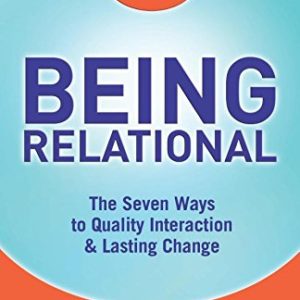
We were at a dinner party, and I felt my husband’s hand gently squeezing my leg underneath the table. This seeming act of romance was actually a pre-arranged signal for me to stop talking. I had begged my hubby to please, please, please–this time–not let me embarrass myself, antagonize another guest, or get overly emotional by getting embroiled in a political discussion because when it comes to politics, I just can’t have a calm and rational conversation. The problem with the knee-squeezing plan is that by the time my dear husband squeezes and RE-squeezes my leg, I’ve already left the stable and there is no reining me back in. He no longer bothers with our little plan, having been ignored one time too many.
There’s a great new book that addresses this very subject. It’s called Being Relational: The Seven ways to Quality Interaction and Lasting Change by Louise and William Senft. I could definitely have used this years ago. The book focuses on ways to overcome habitual and reactionary responses–“That’s the most ridiculous thing I’ve ever heard!”–that get in the way of quality dialogue and positive interactions with others. So, for example, you’re at that dinner party and someone says something like “Electing Hillary would be a disaster!” or “Building that wall would be a ‘yuge’ mistake” and you have an immediate reaction that’s not conducive to having a quality conversation. The authors describe it this way:
“In conflict, you have an experience that is mental, emotional, and physical. You become instantly more physically constricted (your heart rate goes up which restricts oxygen) and instantly more emotionally and mentally self-absorbed the moment you experience conflict. The experience of conflict with another person triggers your personal reactivity, hijacking logical thinking because your pre-frontal brain, where rational thinking occurs, doesn’t get the oxygen it needs to work optimally and this happens no matter how saintly or how smart and worldly you are.”
Yep. Been there. Done that. Add a couple of glasses of wine to the mix and “Whoa, Nelly!” More importantly, when your brain is “hijacked,” the authors say you decrease your ability to listen deeply and reflect on what the other person is saying or doing, and that’s when you are in danger of burning bridges and alienating others. (Hmm, maybe that’s why we don’t have as many dinner invites these days.)
So what to do? The authors of the book expertly suggest a three-pronged approach: be “engaged, centered, and grounded.” One of my faves is learning how to be centered, to quell habitual negative responses and say something like:
“I’m interested in why you said that.” or “While I might see this differently than you do, I see you care deeply about this”…When you say that ‘I want to understand why it is important to you,’ you suspend your judgment of others and remain open. Open to getting new information. Open to gaining better understanding of others….It’s being strong enough to be vulnerable, open, welcoming to others, even when our veiwpoints are different or our interactions are unpleasant.”
Now the truth is that over time I have learned to avoid dinner party faux pas by avoiding certain subjects. No doubt age and experience have helped too. But I like the idea of not being afraid of having difficult conversations, of being able to talk politics, and of knowing that I have a strategy in place to have meaningful and positive conversations whether at work or at home.
And, doggone it, I’m a lot of fun at dinner parties! Take a look below.
Leave a Reply